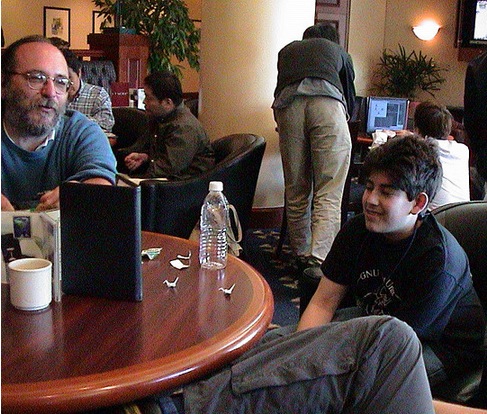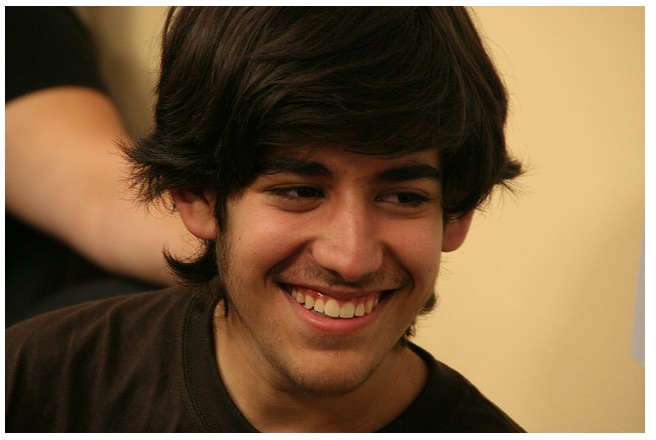Aaron Swartz died yesterday, a suicide at 26. I always felt a kinship with Aaron, in part because we were living demographic bookends. At many of the events we both attended, at least early on, he was the youngest person there, and I was the oldest. When I first met him, he was fourteen years old, and already a figure in the industry, in spite of his youth and diminutive stature at the time. Here he is with Dave Winer, I believe at an O’Reilly conference in San Jose:
It’s dated May 2002, when Aaron was fifteen. That was the same year I booked him for a panel at Comdex in Las Vegas. His mom dropped him off, and his computer was an old Mac laptop with a broken screen that was so dim that I couldn’t read it, but he could. He rationalized it as a security precaution. Here’s a photo, courtesy of Mary Wehmeier. Here’s another I love, from the same Berkman Center set that also contains the one above:
All those are permissively licensed for re-use via Creative Commons, which Aaron helped create before he could shave.
Aaron’s many other passions and accomplishments are well-described elsewhere, but the role he chose to play might be best described by Cory Doctorow in BoingBoing: “a full-time, uncompromising, reckless and delightful shit-disturber.” Cory also writes, “Aaron had an unbeatable combination of political insight, technical skill, and intelligence about people and issues. I think he could have revolutionized American (and worldwide) politics. His legacy may still yet do so.”
I hope that’s true. But it would have had a much better chance if he were still here doing what he did best. We haven’t just lost a good man, but the better world he was helping to make.
[Later…] Larry Lessig makes the case that Aaron was driven to end his life by the prospect of an expensive trial, due to start soon, and the prospect of prison and worse if he lost the case and its appeals. Writes Larry ,
[Aaron] is gone today, driven to the edge by what a decent society would only call bullying. I get wrong. But I also get proportionality. And if you don’t get both, you don’t deserve to have the power of the United States government behind you.
For remember, we live in a world where the architects of the financial crisis regularly dine at the White House — and where even those brought to “justice” never even have to admit any wrongdoing, let alone be labeled “felons.”
In that world, the question this government needs to answer is why it was so necessary that Aaron Swartz be labeled a “felon.” For in the 18 months of negotiations, that was what he was not willing to accept, and so that was the reason he was facing a million dollar trial in April — his wealth bled dry, yet unable to appeal openly to us for the financial help he needed to fund his defense, at least without risking the ire of a district court judge. And so as wrong and misguided and fucking sad as this is, I get how the prospect of this fight, defenseless, made it make sense to this brilliant but troubled boy to end it.
Fifty years in jail, charges our government. Somehow, we need to get beyond the “I’m right so I’m right to nuke you” ethics that dominates our time. That begins with one word: Shame.
One word, and endless tears.
[Later again, 13 January, Sunday morning…] Official Statement from the family and partner of Aaron Swartz is up at http://RememberAaronSw.tumblr.com. Here it is, entire:
Our beloved brother, son, friend, and partner Aaron Swartz hanged himself on Friday in his Brooklyn apartment. We are in shock, and have not yet come to terms with his passing.
Aaron’s insatiable curiosity, creativity, and brilliance; his reflexive empathy and capacity for selfless, boundless love; his refusal to accept injustice as inevitable—these gifts made the world, and our lives, far brighter. We’re grateful for our time with him, to those who loved him and stood with him, and to all of those who continue his work for a better world.
Aaron’s commitment to social justice was profound, and defined his life. He was instrumental to the defeat of an Internet censorship bill; he fought for a more democratic, open, and accountable political system; and he helped to create, build, and preserve a dizzying range of scholarly projects that extended the scope and accessibility of human knowledge. He used his prodigious skills as a programmer and technologist not to enrich himself but to make the Internet and the world a fairer, better place. His deeply humane writing touched minds and hearts across generations and continents. He earned the friendship of thousands and the respect and support of millions more.
Aaron’s death is not simply a personal tragedy. It is the product of a criminal justice system rife with intimidation and prosecutorial overreach. Decisions made by officials in the Massachusetts U.S. Attorney’s office and at MIT contributed to his death. The US Attorney’s office pursued an exceptionally harsh array of charges, carrying potentially over 30 years in prison, to punish an alleged crime that had no victims. Meanwhile, unlike JSTOR, MIT refused to stand up for Aaron and its own community’s most cherished principles.
Today, we grieve for the extraordinary and irreplaceable man that we have lost.
Funeral and other details follow at the bottom of that post, which concludes, Remembrances of Aaron, as well as donations in his memory, can be submitted at http://rememberaaronsw.com.
Also, via @JPBarlow: “Academics, please put your PDFs online in tribute to @aaronsw. Use #pdftribute.” Here’s the backstory.
A memorial tweet from Tim Berners Lee (@TimBerners_Lee): Aaron dead. World wanderers, we have lost a wise elder. Hackers for right, we are one down. Parents all, we have lost a child. Let us weep.
Some links, which I’ll keep adding as I can:
- Remember Aaron (by the family, a place to post remembrances)
- Aaron Swartz was not a hacker. He was a builder. (David Weinberger)
- At a young age, Aaron Swartz did a lifetime of work (NPR)
- Freedom to Connect: Aaron Swartz (1986-2013) on Victory to Save Open Internet, Fight Online Censors (Freedom to Connect talk, 2012)
- How the legal system failed Aaron Swartz—and us (Tim Wu in The New Yorker)
- Aaron Swartz: An open letter to his prosecutor (Jesse Kornbluth in The Head Butler)
- On humanity, a big failure in the Aaron Swartz case (Kevin Cullen in the Boston Globe)
- My Aaron Swartz, whom I loved (by Quinn Norton… heart-wrenching, and required reading … she also posts this)
- At MIT, soul-searching follows in Swartz case (Matthew Lynley in The Wall Street Journal)
- The web responds to the death of hacker-activist Aaron Swartz (excellent compilation of tributes by Matthew Ingram in Gigaom)
- “If someone is in need of knowledge and you can provide it, but you don’t, you are guilty of a crime against the human spirit…” (Jay Rosen in Quote & Comment)
- Plea bargaining and torture in light of the Aaron Swartz case (Phillip Greenspun)
- Remembering Aaron Swartz (John Schwartz in the New York Times)
- Goodbye, Aaron (Ethan Zuckerman)
- Processing the loss of Aaron Swartz (danah boyd)
- Online Grieving (Dave Winer) I have a comment that follows.
- The Inspiring Heroism of Aaron Swartz (Glenn Greenwald in The Guardian)
- Aaron Swartz (1986-2013), Web Technologist & Internet Activist (Scott Beale, with many good links missed below)
- Aaron Swartz was ‘killed by the government’ father tells mourners (LA Times)
- Aaron Swartz funeral: Internet prodigy mourned in Highland Park (Chicago Tribune)
- Free culture advocate may pay high price (Noam Cohen in the NYTimes)
- Suicide reporting on the Internet (Tupperwolf)
- A Tribute to Aaron Swartz (Tangerine Bolen in Common Dreams)
- The democratic promise of Aaron Swartz (Micah Sifry)
- The Truth about Aaron Swartz’s “Crime” (Alex Stamos)
- Remember Aaron Swartz by working for open society and against government abuses (Dan Gillmor)
- I Have Something to Say about Aaron Swartz’s Suicide and the Special Way the US Justice Dept Hounds People to Death (Susie Bright)
- Was Aaron Swartz stealing? (Maria Bustillos in The Awl)
- Aaron Swartz’s Politics (Matt Stoller in Naked Capitalism)
- Internet Activist Aaron Swartz Commits Suicide (mashable.com)
- Farewell to Aaron Swartz, an extraordinary hacker and activist (Peter Eckersly at EFF)
- Aaron Swartz (Patrick Nielsen-Hayden in Making Light)
- Remember Aaron Swartz (new Tumblr page)
- Remembering Aaron Swartz (Rick Perlstein in The Nation)
- Hacker and Reddit co-founder Aaron Swartz dies (theverge.com)
- Aaron Swartz, rest in peace (kottke.org)
- Aaron Swartz Commits Suicide (news.slashdot.org)
- Why we should remember Aaron Swartz (BusinessWeek)
- RIP Aaron Swartz – a sad news (semanticreatures.com)
- Former Reddit Co-Owner and Internet Activist Aaron Swartz Commits Suicide (gizmodo.com)
- 26-Year-Old Reddit Co-Founder Aaron Swartz Has Died (businessinsider.com)
- Legal Case Strained Troubled Web Activist (Wall Street Journal — details Aaron’s failed efforts to reach a deal with prosecutors)
- Hacktivist’s suicide intensifies criticism of U.S. attorney, MIT (Matt Pearce in the LA Times)
- From the archives: Highland Park teen is finalist in web competition (A June 23, 2000 piece in the Chicago Tribune, re-run today. Aaron was thirteen when it ran.)
- Aaron Swartz’s Death Is A Tragedy — And There Are Some Questions That Need To Be Answered (Henry Blodget in Business Insider)
- Will Aaron Swartz’s Suicide Make the Open-Access Movement Mainstream? (Andrea Peterson in Slate)
- Reddit Cofounder, Digital Activist Aaron Swartz Dead from Suicide at 26 (gawker.com)
- Friends, Colleagues Mourn Web Pioneer Aaron Swartz, Key Architect of Creative Commons (commondreams.org)
- A Data Crusader, a Defendant and Now, a Cause (Noam Cohen in the NYTimes)
- The feds who wouldn’t budge (Daily Beast)
- The death of Aaron Swartz (Clive Crook in the Atlantic)
- Berners-Lee calls Aaron Swartz’ prosecution a “travesty of justice” (Bloomberg)
- RIP Aaron Swartz (ergodicity.net)
- The Archives (Aaron’s blog)



Leave a Reply